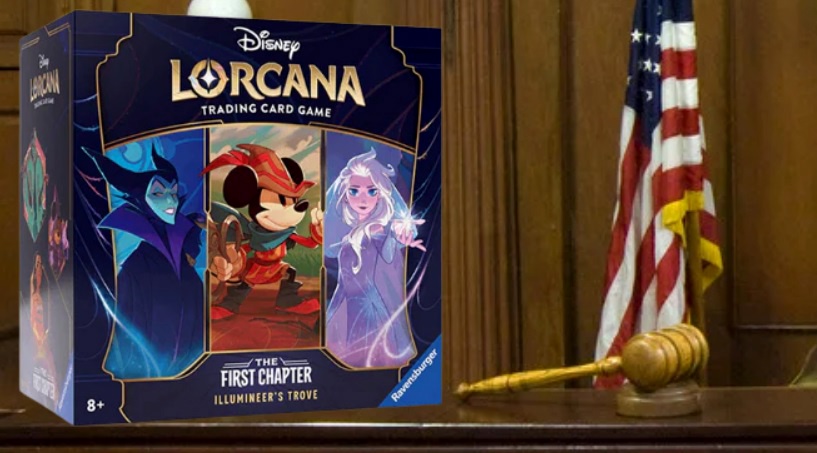Disney Lorcana Creator Emerges Victorious as Lawsuit Dismissed
A federal judge has dismissed all of Upper Deck's copyright infringement claims, bringing the over two-year legal battle to a close.
Ravensburger announced today that it has been vindicated in the copyright infringement lawsuit brought against it by competitor Upper Deck over the popular Disney Lorcana Trading Card Game. A federal judge in Seattle has dismissed all of Upper Deck’s claims, bringing a decisive end to the legal dispute that began in June 2023.
What’s Happening:
- On Friday, October 3, 2025, U.S. Federal Judge Kimberly Evanson issued a detailed order that emphatically and conclusively rejected all of Upper Deck’s copyright infringement claims against Ravensburger.
- The court’s decision was made after reviewing all evidence, including more than 25 depositions and thousands of documents. The judge concluded that "no reasonable person could find copyright infringement."
- The lawsuit, which lasted almost three years, was filed by Upper Deck, who alleged that Ravensburger and a former Upper Deck game designer had stolen an original game concept that was then repackaged and marketed as Disney Lorcana.
- Following the dismissal, Upper Deck filed last-minute motions to reframe and extend the lawsuit, but Judge Evanson pointedly rejected these efforts on October 15, noting Upper Deck had "no good cause" and had "not shown any diligence."
- Ravensburger’s position has consistently been that trading card game mechanics are not protectable under copyright law, a stance they feel has been upheld by the court’s decision.
- We previously covered the filing of the lawsuit by Upper Deck back in 2023.
What They’re Saying:
- David A Perez, partner at Perkins Coie and lead counsel: “After reviewing all the facts in this case, the Court concluded that no reasonable person could find copyright infringement—which is what Ravensburger has been arguing since Day 1. Several current and former game developers from Upper Deck came out strongly in favor of Ravensburger. That Upper Deck’s own developers disagreed so strongly with their case shows that these claims should never have been filed in the first place."
- Brian Lewis, Legal Advisor for Ravensburger: “We were steadfast in our position that Ravensburger has conducted themselves with the utmost integrity. Judge Evanson reiterated the well-known law that game mechanics are not protectable expression under copyright law. This lawsuit was without merit, and we feel gratified that the judge agreed with our reasoning."
The Line Between Mechanic and Expression
- The court's ruling in favor of Ravensburger hinges on a foundational principle of copyright law that is particularly relevant in the world of game design: you can’t copyright an idea or a system, only the specific expression of it.
- In the context of a trading card game, this means the core rules and mechanics (how you draw cards, play resources, attack, or achieve a win condition) are not protectable.
- This legal precedent is what allows the gaming industry to innovate and build upon established genres.
- For example, the "tapping" mechanic, popularized by Magic: The Gathering to indicate a card has been used for the turn, is a system.
- Other games can, and do, use similar systems of exhausting a card without infringing on copyright.
- Likewise, the concept of a "deck-building" game, where players acquire cards to build their deck during gameplay, was pioneered by the game Dominion but is now a common mechanic in dozens of other titles.
- The court’s decision reaffirms that while Upper Deck may have been developing a game with certain mechanics, those mechanics themselves are part of the common language of game design, free for others to use. Ravensburger's victory is seen by many in the industry as a crucial defense of this creative commons, ensuring designers can continue to be inspired by one another without fear of litigation over the basic building blocks of play.
More Lorcana News:
- "Disney Lorcana" Previews 2026 Additions — Including Debut of "Turning Red" and a Name for Set 12
- How "Disney Lorcana: Whispers in the Well" Introduces New Card Types and Game Mechanics
- Do You Want to Build a "Disney Lorcana" Collection? New Collectors and Gift Sets Now Available
- Photos / Video: Enter The Beast's Library for a Limited-Time “Disney Lorcana" Experience at Disney California Adventure
- Artist Signing and Promo Card Accompany the Release of “Disney Lorcana: Fabled" at Disney Springs
Sign up for Disney+ or the Disney Streaming Bundle (Disney+, ESPN+, and ad-supported Hulu) now



